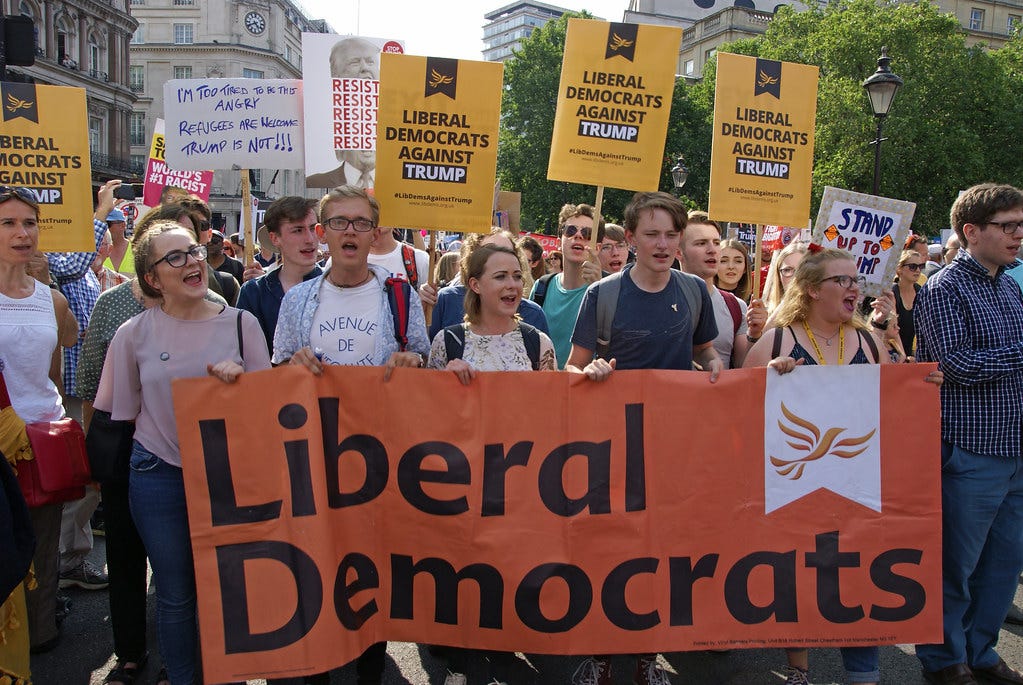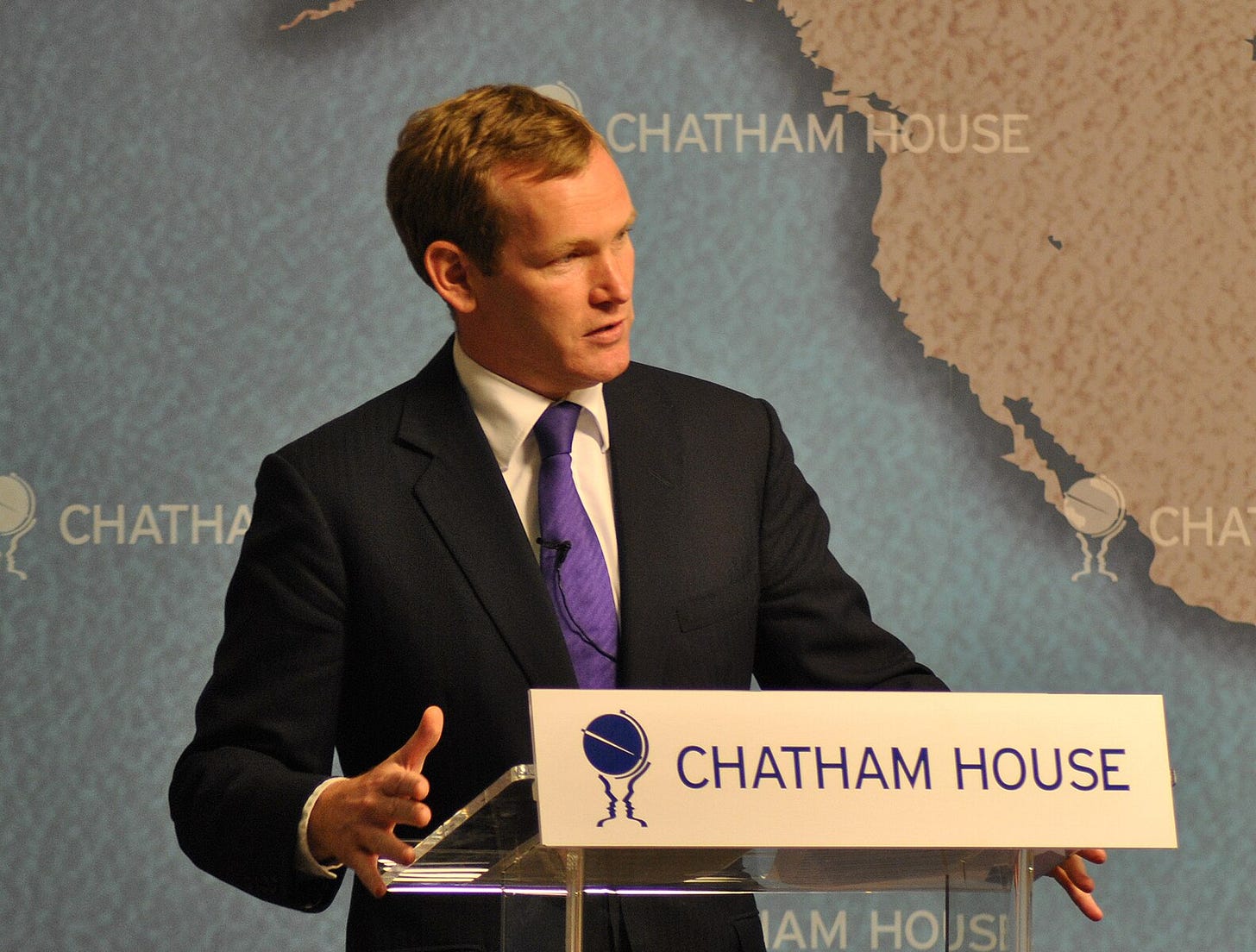Do the Lib Dems really want to replace the Tories?
Ed Davey has set his sights on Middle England. That will require a rightward shift his party may not want to make
I have a Jeremy Browne1 anecdote. For various reasons, some time around 2014, I was loitering in a corridor at BBC Millbank during the filming of Daily Politics. On the show that day was, amongst other people, Browne as well as the darling of the Tory right, Liam Fox.
To be honest, I was not paying forensic attention. Daily Politics aired around lunchtime so I was probably researching where on the parliamentary estate was serving jerk chicken2. It was what happened next that I vividly recall. As the guests departed, I heard Fox confide to an aide with a smile: “It’s not often that I’m not the most right-wing member of a panel.”
He was referring, of course, to Browne, a man closely associated with the Orange Book tradition of the Lib Dems. Essentially, classical free market liberals as opposed to those soggy social democrats. Indeed, Browne was sufficiently right-wing that he was approached by then Conservative Party chair Grant Shapps to defect. Instead, Browne said he wanted more people like him to join the Lib Dems. Might he finally be getting his wish?
At the launch of his party’s local elections campaign, Lib Dem leader Sir Ed Davey declared his intention to replace the Tories as the “party of Middle England”. Helpfully, he is not starting from scratch. The party recorded its best-ever result at the 2024 general election, winning 71 constituencies, including the seats of two former Tory prime ministers and numerous cabinet members.
The Lib Dems won formerly true blue seats such as:
Cheltenham: Conservative since 2005
Maidenhead: Conservative since its creation in 1997
Witney: Conservative since its creation in 1983
Chichester: Conservative since 1924
Indeed, the party now holds four seats in Oxfordshire, five in Sussex, six in Surrey and 11 in Devon and Somerset. In a more European, proportional voting system, there is always space for a small liberal party to float between the main social and Christian democratic ones. But under first-past-the-post? The Lib Dems are all too aware of the risk of getting squeezed at best, obliterated at worst.
Still, the opportunity is unmistaeable, in large part thanks to events outside of Lib Dem control. Under Kemi Badenoch, the Tories appear keener than ever to tack right in order to counter the easy populism of Nigel Farage. Waiting in the wings should she fail is an even shriller alternative, Robert Jenrick. Should either Badenoch or Jenrick lead their party into the next election, there will be plenty more well-off voters with a social conscience in Tory-Lib Dem marginals who may be prepared to pull the yellowy-orange lever.
Yet I still question whether the Lib Dems actually want this. Not that they fear power, but if their members or even MPs will do the things and hold the positions necessary to ultimately dislodge the Tories as the main opposition party. It reminds me of the revealing criticism of Tony Blair levelled by Neal Lawson, director of Compass, a left-wing pressure group, that “the wrong people were voting Labour.”
It is not that the Lib Dems are strangers to holding distinctive political positions. In 1997, Paddy Ashdown pledged to put a penny on income tax to fund education spending3. While in 2005, Charles Kennedy made great play of his opposition to the Iraq War.
But in reality, the Lib Dems were ones you voted for if you wanted to support a party with no chance of ever forming a government. These anti-establishment credentials were badly damaged by the coalition, and also explain why so many voters switched to Ukip around that time, a party with seemingly little policy crossover.
There are a few reasons to think the Lib Dems might be able to pull it off this time. First, the Tories are being dragged further from the centre by Reform. Second, they are the only major party with the freedom to campaign vigorously against Donald Trump, a deeply unpopular figure in the UK, even among the right. Third, it can focus on domestic issues that unite voters, such as preventing sewage dumping and protecting waterways. And fourth, the Labour leader does not scare anyone4.
But politics is filled with more ideologues than opportunists. People who go out in all weather to knock on the doors of total strangers really do believe in things. You have to. Political parties are not the same as businesses spotting a gap in the market to sell their product. See the brouhaha surrounding the party’s housebuilding policy.
The local elections on 1 May are likely to be bad for Labour, good for Reform and calamitous for the Conservatives. In all that, the Lib Dems may well become the second party of local government. Whether they can repeat the feat at a general election and replace the Tories depends on a whole host of factors outside of their control. But first, they have to answer one simple question: do they really want to?
For normal people, some background: Browne was the Lib Dem MP for Taunton Deane from 2005-2015, and a minister in the foreign office during the coalition government
You’d be amazed how many people thought this meant an actual penny, rather than 1%. No wonder it was such a popular policy
When Labour is led by someone who scares voters, people who might have supported the Lib Dems often vote Conservative





I look forward to the day when politicians will understand that what they say commits them to what they do. Farage does not believe a word he says, and anyone who does will regret voting for him. Like the Americans who voted for Trump, anyone who gives Reform a majority on a council will find it hard to reconcile promises with subsequent actions.
Interestin thought
https://ttocb.blogspot.com/2025/04/the-overton-window.html